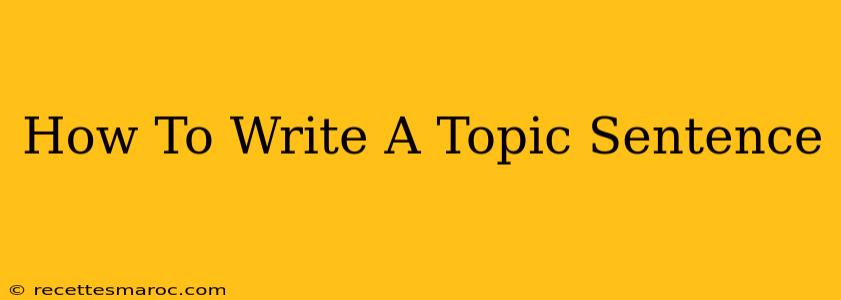Writing a strong topic sentence is crucial for effective communication. It's the backbone of any paragraph, providing focus and direction for the reader. This guide will walk you through the essential elements of crafting compelling topic sentences that will elevate your writing.
What is a Topic Sentence?
A topic sentence is the main idea of a paragraph, expressed in a single sentence. It acts as a roadmap, telling the reader what the paragraph is about and setting the stage for the supporting details that will follow. Think of it as the thesis statement of your paragraph. It's typically located at the beginning of the paragraph, but it can also appear in the middle or, rarely, at the end, depending on stylistic choices.
Key Elements of a Strong Topic Sentence:
-
Clarity: The sentence should be easily understood and free of ambiguity. Avoid jargon or overly complex language. Simplicity is key.
-
Focus: It needs to clearly state the main point of the paragraph. Avoid broad generalizations. A specific focus helps maintain paragraph unity.
-
Conciseness: Use precise language and avoid unnecessary words. Get straight to the point. Every word should contribute to the overall meaning.
-
Relevance: The topic sentence must be directly related to the overall theme of your writing. It should support your essay's or article's central argument.
-
Controversial (Optional): Depending on the context, a slightly controversial topic sentence can grab the reader's attention and make your writing more engaging. This works best when properly supported by evidence.
How to Write a Topic Sentence: A Step-by-Step Guide
-
Identify the Main Idea: Before writing your sentence, determine the core message you want to convey in the paragraph. What's the central point you want to make?
-
Choose Keywords: Select key terms that accurately reflect the paragraph's subject. These will help to maintain focus and provide a clear direction for your writing.
-
Craft Your Sentence: Using your keywords, write a sentence that clearly expresses the main idea. Aim for clarity, conciseness, and a logical flow of ideas.
-
Review and Revise: Once you've written your sentence, reread it to ensure it accurately reflects the paragraph's content and is easy for your reader to understand. Are there any unnecessary words? Is the meaning clear?
Examples of Effective Topic Sentences:
-
Weak: Cats are interesting. (Too vague and lacks focus)
-
Strong: Domestic shorthair cats are known for their adaptability and playful personalities, making them popular family pets. (Specific, clear, and informative)
-
Weak: The internet is important. (Too broad)
-
Strong: The internet has revolutionized communication, enabling instant global connectivity and fostering unprecedented collaboration. (Specific and highlights a key impact)
Practice Makes Perfect:
The best way to improve your ability to write strong topic sentences is through practice. Experiment with different styles and approaches, and pay attention to how effective your sentences are in guiding the reader through your writing.
Conclusion:
Mastering the art of writing effective topic sentences is a fundamental skill for any writer. By focusing on clarity, conciseness, and relevance, you can create paragraphs that are focused, engaging, and easy to understand. Consistent practice will help you develop this skill and improve the overall quality of your writing significantly. Remember to always revise and refine your work to ensure the impact is maximized.

